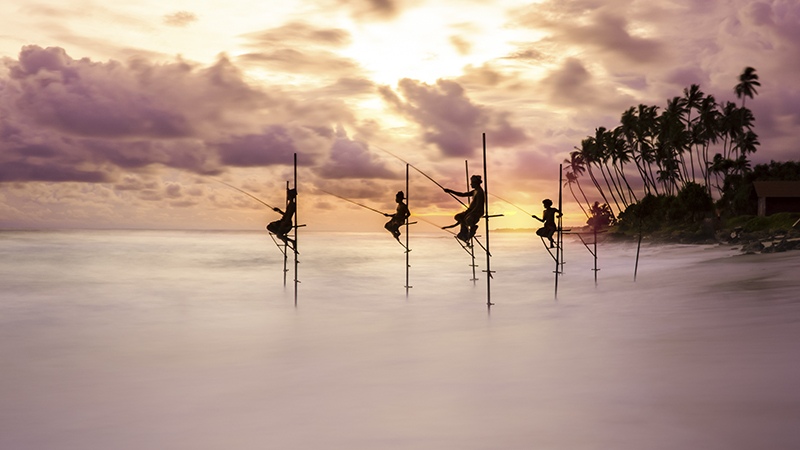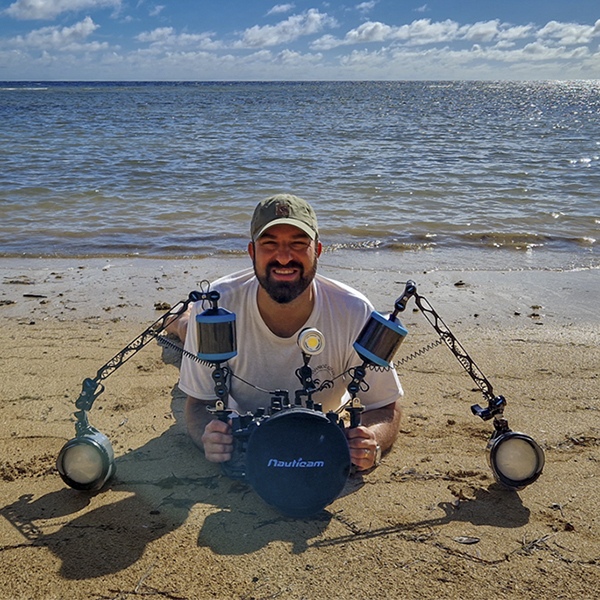Living by the Water Through the Lens of Pavlos Evangelidis: 2024 World Nature Photography Awards Winner
As the sun dipped towards the horizon, the sky was painted with dramatic clouds tinged with warm hues of pink, orange, and purple. The soft light reflected on the Indian Ocean, casting a golden glow on the water’s surface. On the shores of Koggala, Sri Lanka, a visual feast unfolded. Several skilled fishermen sat on slender poles, practicing the unique traditional method of stilt fishing.
Esteemed photographer Pavlos Evangelidis masterfully used a 10-second long exposure to soften the crashing waves while sharply capturing the fishermen, creating a striking contrast between the ocean’s perpetual motion and the fishermen’s calm demeanor. This image, titled “Catch of the Day,” recently won first place in the “Humans and Nature” category at the 2024 World Nature Photography Awards.
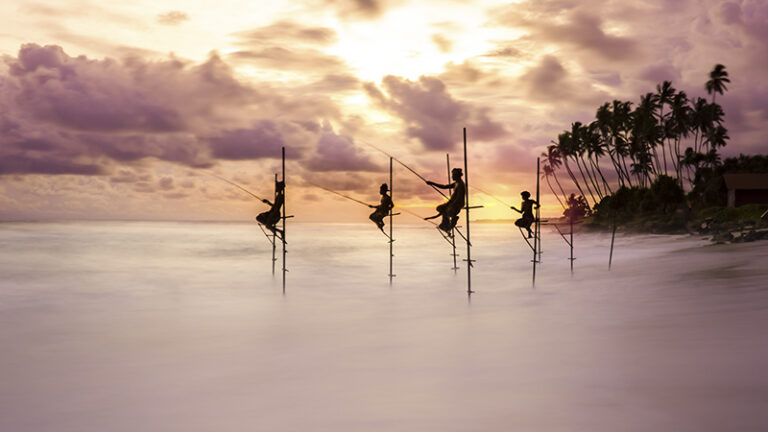
This award-winning photo was taken during a meticulously planned family vacation. While exploring the diverse landscapes of Sri Lanka, Evangelidis was inspired by a serendipitous encounter with a postcard depicting stilt fishermen, sparking his desire to create this iconic imagery. Accompanied by his family and a local guide, he traveled along the coastal regions from Galle to Mirissa, searching for the perfect backdrop for a sunset scene. This journey culminated on a breathtaking beach near Koggala, where all the elements came together perfectly, providing an ideal setting for his shoot.
Capturing this scene was no easy task. He stood in ankle-deep water, battling unpredictable and corrosive waves, using a waterproof cover to protect his camera and responding swiftly to the changing ocean conditions. Additionally, he needed to adjust settings in real-time to ensure clarity and composition. Despite facing numerous challenges, he ultimately succeeded. Although he encountered many difficulties and even had to abandon his damaged tripod, these sacrifices were worth it, as the final result left him satisfied.
The cultural significance of Evangelidis’s work is profound. Through his lens, he meticulously documents traditional fishing practices, which are not merely methods of subsistence but are emblematic of cultural identity and heritage. His work emphasizes the importance of preserving these artisanal techniques, enriching our understanding of cultural continuity and the human connection to nature. “The ocean has always been my primary muse, both above and below its surface,” Evangelidis shares. “Incorporating the human element into these seascapes adds a layer of narrative that is both personal and universal.”
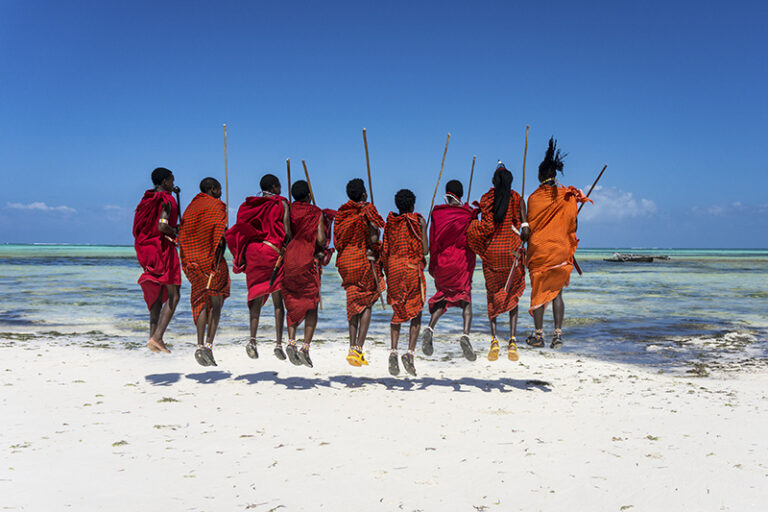
His ongoing project, the “Humans to Ocean (H2O)” series, delves deeper into the lives of those whose existence is inextricably linked with the sea. “This project is about exploring the complex relationship of dependence and coexistence between human communities and the ocean,” he explains. The photographs serve as a bridge, connecting viewers to distant cultures and reminding us of the universal value of our waterways and the communal lives they support.
Moreover, Evangelidis is driven by a conservation ethos that permeates his work. “Every image I capture and share is an opportunity to convey the urgency of preserving our natural world,” he states. The stories embedded in his images advocate for sustainable practices and support efforts to combat the environmental impacts of industrial fishing, which often overshadow traditional methods. By promoting local fish products and sustainable fishing practices through his photography, Evangelidis celebrates cultural heritage while championing environmental stewardship.
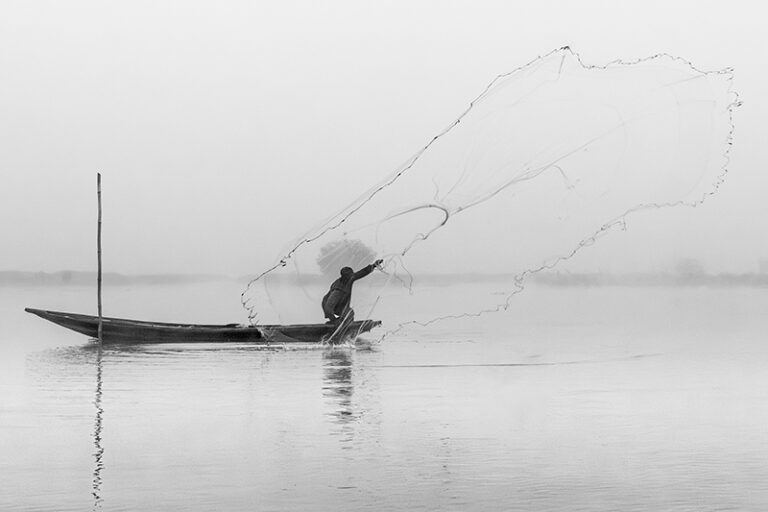
Pavlos Evangelidis ventured into the remote and isolated community of Ganvié in Benin to document its life a few years ago. Ganvié was established in the 17th century as a refuge for people escaping slave traders and has since developed into a vibrant community reliant on fishing. He recalls, “My goal was to reflect the resilience and adaptability of this community thriving in a delicate ecological balance.” The image of a local fisherman casting his net in the early morning mist is poignant, vividly portraying the daily life and environmental challenges of this floating village.
However, this photo and others from Ganvié highlight some critical environmental issues, such as the overuse of “acadja” fishing techniques and long net fishing, which threaten coastal ecosystems. Evangelidis’s photography not only documents these fishing methods but also aims to raise awareness and foster dialogue to promote more sustainable fishing practices.
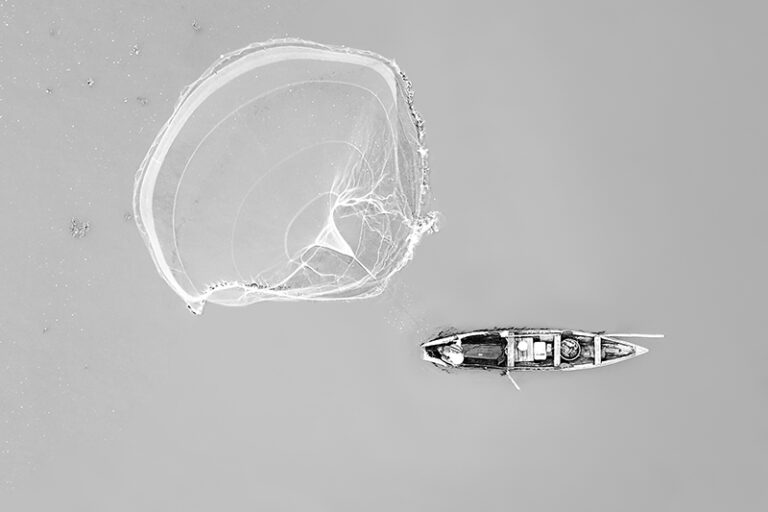
Photographing remote and unique environments like Ganvié presents distinct challenges, as Pavlos Evangelidis knows well. His adventures into isolated locations demand meticulous planning and the transportation of heavy, often bulky equipment—challenges intensified when working underwater. “Last January, while on a long-awaited trip to Chuuk Lagoon in Micronesia to photograph World War II wrecks, my 35kg of gear failed to arrive, leaving me stranded without essential equipment due to an airline mishap. It was a stark reminder of the unpredictability in remote photography,” Evangelidis recounts. Although residing in Cotonou since 2021 has made access to Ganvié—a mere hour’s drive and a short boat ride away—more feasible, the logistical challenges of such shoots are ever-present.
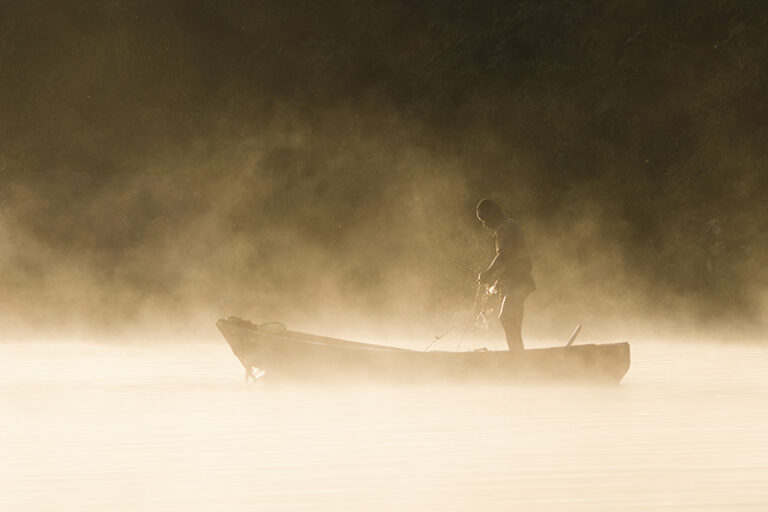
When documenting the economic realities of water-based communities, Evangelidis strives to balance aesthetic appeal with an authentic portrayal of local life. His philosophy centers on capturing the world as it is, aiming to highlight natural beauty and human resilience without fabrication. “Though humans aren’t usually my primary focus, their presence in my photos helps convey urgent conservation messages and connects viewers to the broader narrative of global interconnectedness,” he explains. However, he emphasizes that the visual appeal of an image is crucial; without it, the message, no matter how powerful, may fail to resonate.
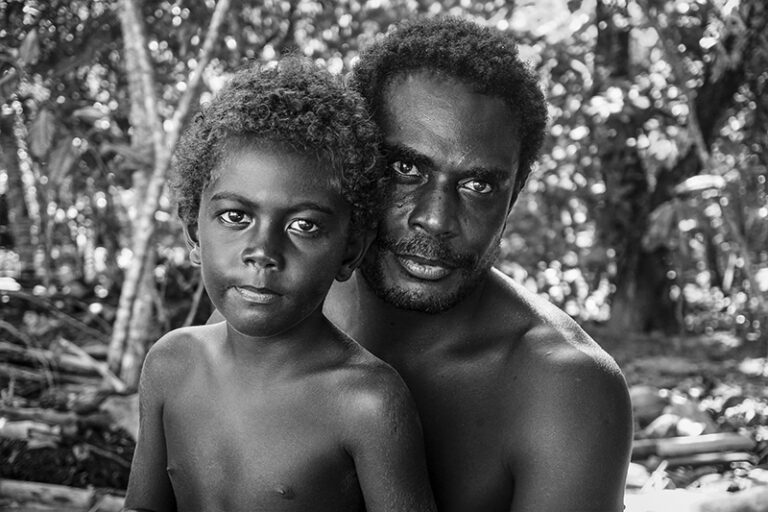
Reflecting on the most rewarding aspects of his work, Evangelidis shared that the greatest satisfaction comes from supporting the daily struggles and challenges of vulnerable communities, often giving a voice to those who are usually unheard. His work in the field of development, including efforts to reduce poverty, naturally complements this motivation. Although he tries to keep photography separate from his professional life, sometimes the two overlap. For example, his photo “Like Father, Like Son,” part of the “Humans to Ocean (H2O)” series, was taken during a work assignment in a remote village in Choiseul Province, Solomon Islands. He was participating in a project combating child exploitation linked to logging and fishing, funded by the European Union and implemented by Save the Children. This spontaneous shot of a father and son sitting together captured a brief, intimate moment. However, the challenge in this kind of photography lies in the potential intrusion into people’s daily lives. He believes that maintaining respect is crucial because no photo is more important than its subjects.
Feedback from audiences around the world has been his greatest encouragement, validating Evangelidis’s efforts, especially his “Humans to Ocean” (H2O) series, which has received widespread acclaim internationally. This recognition is not only gratifying but has also enabled him to financially support environmental organizations, thereby extending the impact of his work beyond photography. Looking ahead, Evangelidis hopes to return to the Pacific to further refine his underwater photography skills and explore new techniques, continuing to document the profound connection between humans and the ocean.
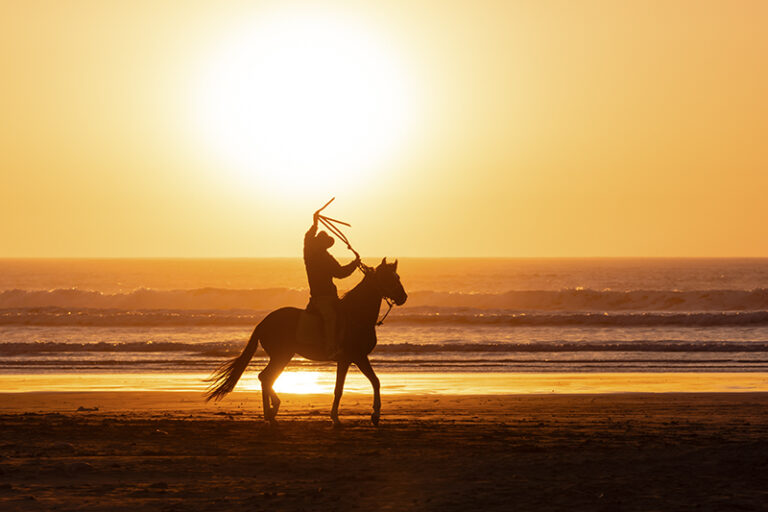
Pavlos Evangelidis’s captivating visual works not only document the beauty and hardships of water-based communities but also provoke deep reflection on the relationship between humans and nature. His works are powerful testaments to cultural preservation and environmental protection, urging us to consider how our actions today will leave a precious legacy for future generations.
Evangelidis’s Instagram
